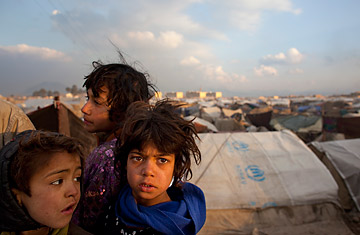
Displaced Afghan children stand outside their tents in Kabul, Afghanistan. The fighting in Helmand has displaced many Afghans who are forced to live in crowded refugee camps.
The Cost of War; Afghan Experiences of Conflict, 1978-2009
Oxfam International
Nov. 18, 2009
52 pages
The Gist:
Three straight decades of war have taken a devastating toll on Afghanistan, sinking the country deeper into political instability and chaos and earning it an unfortunate reputation as one of the most dangerous places in the world. Though several books and articles have been dedicating to analyzing the embattled country's troubled history, little has been written on the effect that these conflicts have had on the lives of ordinary Afghans.
After conducting more than 700 interviews with randomly selected Afghans across 14 provinces, Oxfam International, in collaboration with seven other non-governmental organizations, has published a report explaining the consequences of Afghanistan's many conflicts, from the Soviet Invasion to the hunt for Osama Bin Laden, through the testimony of civilians who have borne the brunt of the struggle.
Highlight reel:
1. One Afghan man's account of the effect that three decades of war have had on the country:"What do you think the effect that two million Afghans martyred, 70% of Afghanistan destroyed, and our economy eliminated has had on us? Half our people are mad. A man who is thirty or forty years old looks like he is seventy years old. We always live in fear. We are not secure anywhere in Afghanistan, whether in Kabul or Jalalabad."
2. On the displacement of civilians: Three in four (76%) [Afghans] interviewed were forced to leave their homes at some point during the past three decades of conflict... many individuals were displaced multiple times, fleeing to a more secure place only to have the fighting reach them again months later or once they had returned home, forcing them to migrate once again.
3. On who is to blame for the current conflict: Seven in ten (70%) saw unemployment and poverty as a major cause of the conflict, while almost half (48%) pointed to the corruption and ineffectiveness of the Afghan government. Other factors that individuals identified as major drivers of the conflict were : the Taliban (36%); interference by other countries (25%); al Qaeda (18%); the presence of international forces (18%); lack of support from the international community (17%); warlords (15%); and criminal groups (14%).
4. An Afghan woman's account of the consequences of the current conflict: "The current conflict has caused lots of tension and concern among people. People are very concerned about their future. In the beginning, people had hope but the ineffectiveness of the current government and bombardment of civilians by international forces made people hate the government and created more opportunities for the anti-government forces."
The Lowdown:
With the 30th anniversary of the Soviet invasion of Afghanistan approaching, this report offers a critical evaluation of the human cost of war through the voices those who have paid it. Millions of Afghans have been killed since the late 1970's, and millions more have been displaced. Along with offering personal accounts of the rampant unemployment, imprisonment, sexual violence and mental trauma that have become widespread side effects of the conflicts for those who remain, the report also explores ways to alleviate conflict recommended by civilians themselves, including urging the government to establish the rule of law at all levels and asking the international community to assist with humanitarian reconstruction and end "adverse foreign interference" in Afghanistan's affairs.
The report's authors are careful to stress that their findings and the testimony the recorded are not meant to be seen as representative of Afghanistan's entire population. They argue that the report can help illustrate the challenges Afghanistan faces in its struggle for peace and security.
